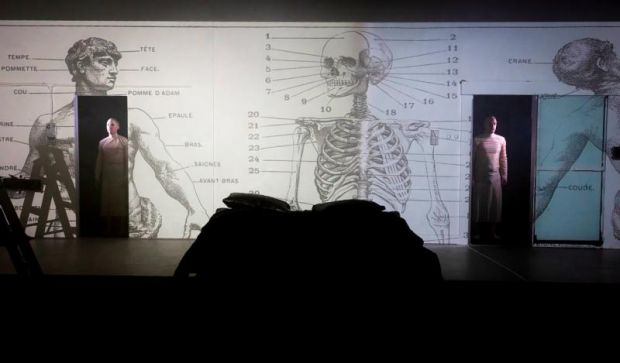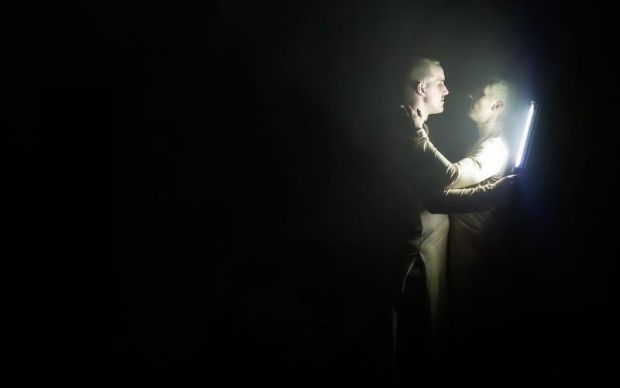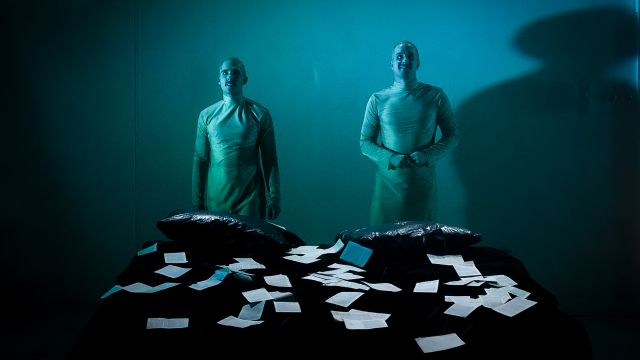Songs of the Flesh
At first, we might say that Songs of the Flesh is a familiar, possibly conventional narrative – even if the mode of presentation is startlingly different. A gay coming of age story that begins as a fairy tale and ends on a city’s mean streets, its defiant happy ending in doubt. When director Steven Mitchell Wright began work, he even wondered – to writer Chris Beckey – if the play was ‘redundant’.
Beckey knew it was not – and Mitchell Wright has now enhanced it in his realisation – in the delivery of the text, in its near unceasing, restless choreography, and its disturbing allegorical design.

Today, there may be more ‘acceptance’ and ‘visibility’ of LGBTIQA+ people – there’s even same-sex marriage - but kids can still be persecuted and excluded even before they themselves realise how they are ‘different’; families can still recoil and reject; there are hate crime shootings in gay clubs, and street violence against trans people – and gays too – is still rife.
Songs of the Flesh is a very physical poetic drama in which two performers, Josh Blake (the ‘Boy from the plains’) and Scott Middleton (the ‘Boy from the forest’) are the protagonists: they are one person, speaking the text together or in counterpoint, a verbal fugue. As the play progresses and the narrative requires it, they can be two boys, or two men. It is not confusing. The Boy grows up in an idyll – a happy loving family, games in the forest with other kids, and reading book after book about Princes and Princesses, heroes and rescuers, fairy tales of romance and happy endings. ‘Love’ becomes the ideal and the goal even if, in all these books, the Boy cannot quite find himself…

Beckey’s initial inspiration was the Biblical love poem, ‘The Song of Solomon’ via a Kate Bush song and they wanted to adapt it for performance. But somehow it didn’t seem to work. There were many rewrites, and the play became an adaptation of Beckey’s own life, with quotes from the Song of Solomon interpolated. The result is a rich (if sometimes repetitious and over-explicit) text, in which the Bible quotations add a sort of poignant majesty to the tale.
Books – and dirt - feature prominently in Mitchell Wright’s design: the stage is lined with books, and they prop up the bed centre stage, as if to say the stories in these books are the basis of our culture, a culture in which some people do not appear – or are condemned – but which, nevertheless present a certain version of ‘love’. What Beckey strives to say that ‘love’ and history are there in our bodies, under the skin, in our flesh. It is the flesh that tells the Boy this when, in a game, his friend rescues him from a fall and lies on him, body to body… The realisation leads to flight, and a kind of betrayal. Betrayal will recur in this story… In the city, there is freedom, euphoria, alienation, degradation. But there is love. Not the love in the books, but a love the flesh recognises.

As for the dirt, there are piles of it across the stage, a heap of it at the end of the bed. It seems to be a reminder of where we come from and what we are, as well as the depths to which we can descend in pain and desperation. The one design element that lost me is the ugly transparent beige tunics the actors wear. Unisex? Medieval?
Songs of the Flesh is gripping even when we know where it’s going, given power by Blake’s and Middleton’s focussed, impassioned performances and movements, Sidney Younger’s detailed lighting design, and Mitchell Wright’s inventive use of the stage and unwavering commitment to the text – the text he doubted at the start.
Michael Brindley
Photographer: Tom Noble
Subscribe to our E-Newsletter, buy our latest print edition or find a Performing Arts book at Book Nook.

